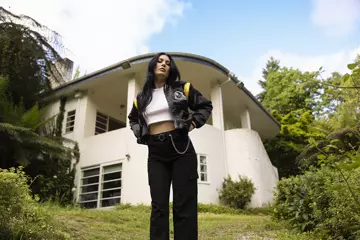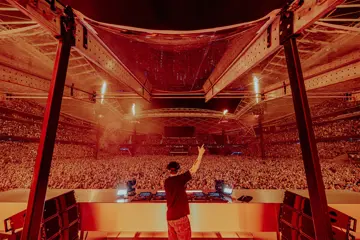"I remember the way your sheets smelt!" hollers Alicia Bognanno, Bully's frontwoman, in the band's single I Remember. Over 108 seconds of boisterous, blown-out indie-rock, Bognanno lets loose with a litany of lyrical memories — whether funny ("I remember throwing up in your car") or momentous ("I remember when I met your dad") — and, come the chorus, she sings simply: "I know what makes you cry."
This is Bully in a nutshell: the Nashville-based band delivering songs that are fast, fuzzy, and fun, and blessed with Bognanno's candour. Across the quartet's debut album, Feels Like, Bognanno digs into plenty of memories ("When I was six I broke my sister's arm," begins Six), reconciles the past with the present (Reason, in which she goes back home), and tends towards unvarnished confession. On single Trying, Bognanno sings, amazingly: "I question everything/My focus, my figure, my sexuality/And how much it matters or why it would mean anything."
"The only thing that unites these songs [on Feels Like], is that they're all personal, they're all real, they're all things that happened," says Bognanno, 25, on the phone from her home in Nashville. "Each song is totally different, about different situations and feelings that I was experiencing at the time. But they're all real."
"They're all personal, they're all real, they're all things that happened."
This lyrical approach, Bognanno admits, didn't come naturally to her. "I used to write more abstract lyrics as way to tiptoe around what I really wanted to say or how I really felt about things," she says. "So it became a focus to me to try and say what I was actually really feeling, so that my songs were actually about something, and every time I sang them live I could relate to it. At first, I was a little bit insecure about it, but after a while it becomes empowering. You don't want to be on stage singing something that doesn't matter, be up there faking it, bullshitting your way through a song. You want to be singing something that really matters."
Don't miss a beat with our FREE daily newsletter
The childhood that Bognanno often references in her songs came in the nondescript suburbs of Minneapolis, in Rosemount, Minnesota. No one else in her family played music, or was even into it. Yet, some of Bognanno's earliest memories are of making up songs, and by her adolescence she had a serious rock'n'roll obsession. "I was a huge Replacements fan; growing up in Minnesota, they really mean something," she recalls. "I loved Silkworm, The Breeders, The Pixies, Sonic Youth. Those basic college-rock bands you get into. You know, loving New Order, lying on your floor, listening to Age Of Consent."
But Bognanno didn't know anyone who played in a band. Her way 'in' was through an audio-engineering class at a nearby school, and when time came to go to college, Bognanno enrolled at Middle Tennessee State University (the same place Sharon Van Etten studied, years before), 30 minutes outside of Nashville, with plans to become an audio engineer. It was there that she first picked up an electric guitar, which proved a formative songwriting experience ("It felt a lot more fun, because it opened up the world of pedals," Bognanno says, "and I still write songs, with Bully, by layering on ideas through a loop pedal"). She sang in a power-pop combo called King Arthur, in which Stewart Copeland — Bognanno's boyfriend, and Bully's future drummer — played guitar. In her final year, Bognanno went and interned at the legendary Electrical Audio studio in Chicago, which is owned and operated by Steve Albini and Bob Weston of Shellac.
"Learning about the history of the rock music scene in Chicago was really cool, and when Kim Deal was there that was a personal highlight," Bognanno recalls. "But obviously I learnt so much more there. The engineers who work there are some of the smartest people I've ever met in my life, and they've built this studio in a very particular way. There's a reason that everything is where it is, and if you ask, they'll give you a really well informed, thoughtful answer explaining why."
While staying in Chicago, Bognanno — away from the familiar, thinking about her friends in Nashville and her family back home in Minnesota — started writing the songs that would form the foundation of Bully. Upon returning to school, she moved to Nashville proper, commuted to her few remaining classes, and started working at local studio Battle Tapes, and doing live sound at The Stone Fox. And, when she played the songs she'd recorded to Copeland, with his encouragement the pair started Bully. Bognanno recorded, to tape, the band's debut, six-song EP in 2013 and then recruited guitarist Clayton Parker and bassist Reece Lazarus to fill out the live band.
"When we were on that tour with Drowners, things started to get a bit crazy."
Bully started playing in Nashville in early 2014, and eight months later things would swiftly change. Bognanno — functioning as the band's leader, manager, tour manager, and sound engineer — booked a tour with alt-rockers Drowners that would lead up to the CMJ Music Conference, and repressed a new version of that self-titled, self-recorded, self-released EP to coincide. Bully's songs were suddenly being bandied about online, they were one of CMJ's buzz bands, and, quickly, unexpectedly, they'd sign to an imprint of Columbia.
"All of a sudden, everything started to happen, super fast," Bognanno recalls. "Initially it didn't, any success we had was pretty modest, pretty local. But when we were on that tour with Drowners, things started to get a bit crazy. In the space of that tour, which was like a month on the road, everything changed. And, since then, we've pretty much been on tour the whole time."
On their way up, Bully would open for Best Coast, Superchunk, Those Darlins, Jeff The Brotherhood, and Kevin Drew. They played a handful of shows in the UK, the first time Bognanno had ever left America. And they recorded their debut album, Feels Like. When the time came, Bognanno knew where she wanted to go: back to Electrical Audio. "I always had my heart set on that," she admits. "I'd obviously interned there, so I was a little bit familiar with the gear, and loved everybody who worked there. And I knew that I wanted to do it on tape. So, what better place to do it?"
Bognanno's goals for Bully's first LP were simple: she wanted it to sound live, and like they do live ("I'm always let down when the live show sounds totally different to the record"); and she wanted to maintain her lyrical commitment to the truth. While the band's fuzzed guitars and big choruses catch the ear, what's earned Bully their growing fanbase is listeners' connections to Bognanno's lyrics. At every show, there'll be someone coming up to the songwriter, telling her just that.
"But, in saying that," Bognanno laughs, "the only people that are going to come up to you are the ones who want to say: 'Oh my God, that song totally feels like it's about me! I totally relate!' I don't think I'll ever hear the other end of it. No one's going to come up to you and be like: 'Yeah, whatever, I don't really relate to that.' So all you get, as songwriter, is the good news. But every time someone says something like that to me, it's a huge compliment. To write a song that other people relate to that strongly, that's the reason you even want to be in a band."















